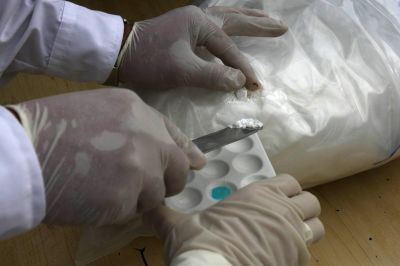Cocaine vaccine shown to reduce some drug use

(AFP) -
Researchers said Monday a new cocaine vaccine in clinical trial has shown promise in reducing use among addicts and could serve as vital treatment for some 1.6 million Americans dependent on the drug.
The authors of a new report say the vaccine reduces use of the drug by raising anti-cocaine antibody levels in the blood, thereby inactivating the cocaine before it enters the brain and gives the user a high.
But in a six-month trial conducted by researchers at Yale University School of Medicine and Baylor College of Medicine, only 38 percent of vaccinated subjects produced antibody levels high enough to sequester the cocaine and significantly reduce the feelings of euphoria from the drug.
And those who did produce enough antibodies maintained them for only two months.
"Optimal treatment will likely require repeated booster vaccinations to maintain appropriate antibody levels," the authors wrote in their report, published Monday in the October issue of the Archives of General Psychiatry.
Senior writer for the report, Thomas Kosten, has been trying to develop a viable cocaine vaccine for 15 years. He began his research in animals, and shifted to humans several years ago, seeking to launch trials in Europe.
Work on the latest Yale/Baylor trial began five years ago, he said.
"Fifteen years ago everyone... said you can't make antibodies to little molecules like this," Kosten told AFP in a telephone interview.
But Kosten insisted he could.
The vaccine causes a large protein molecule to attach to the smaller cocaine molecule, which stimulates the immune system to produce antibodies that recognize the drug and prevent it from reaching the brain, he said.
The trial involved a total of 115 "cocaine-dependent individuals" -- 58 who received five shots of the active vaccine and 57 who received placebos. All underwent rigorous urine testing for the drug.
Of those who took all five vaccinations, 38 percent reached cocaine antibody levels of 43 micrograms per milliliter or higher, seen as enough to ward off the drugs' euphoric effects.
Cocaine use among that group plunged, with those participants having significantly more cocaine-free urine samples between weeks nine and 16 of the study, according to the findings.
Kosten stressed that another 40 percent of subjects "were producing levels of antibodies that would block a typical single use of cocaine, which would keep people from relapsing."
There is no existing US-approved pharmacological therapy for cocaine abuse, and treatment now mostly involves psychiatric counseling and 12-step programs.
The costs for treating cocaine or contending with overdoses has skyrocketed into the billions of dollars per year.
In the United States about 40 percent of cocaine addicts, or 650,000 people, receive treatment, Kosten says, and one in three drug-related emergency room visits is connected to cocaine abuse.
The United States is the world's number one market for cocaine, and protecting illicit but lucrative narco-trafficking routes from Mexico across the border has led to an explosion of violence in Mexico that has left thousands dead.
mlm/jm
Join our commenting forum
Join thought-provoking conversations, follow other Independent readers and see their replies
Comments
Bookmark popover
Removed from bookmarks